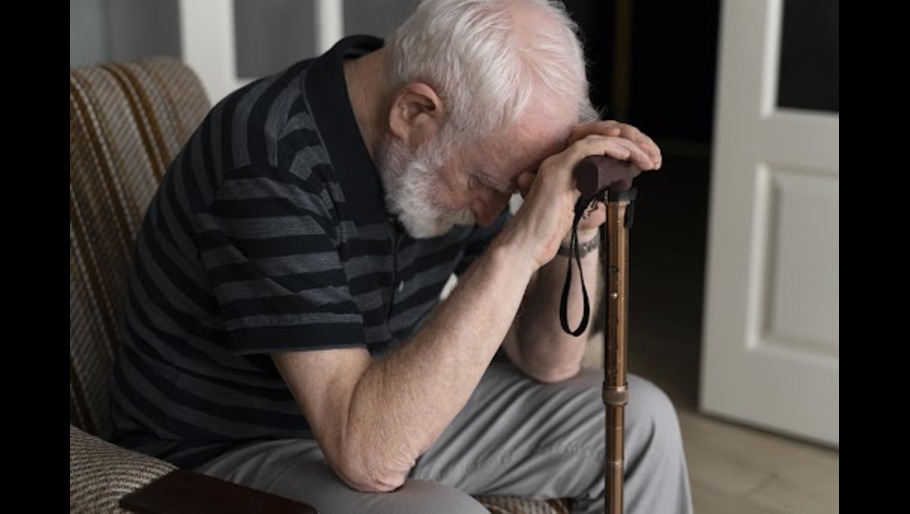In a country like India, where respecting elders is a core part of our values, it is painful to admit that elder neglect often goes unnoticed. While we talk about caring for children and the youth, the needs of older adults are frequently overlooked, especially when they need support the most.
According to the study, 5.2% of older adults aged 60 and above reported experiencing abuse, with 3% facing abuse within their own households. These numbers hint at a silent crisis that deserves urgent attention.
At Care For You India, we believe that the way a society treats its elderly speaks volumes about its compassion. This blog explores elder neglect, how to identify it, why it happens, its effects, and what we can do to stop it.
What Is Elder Neglect?
Elder neglect is when an older person’s basic needs, like food, hygiene, medical care, or emotional support, are not met by their caregivers. This could happen in a home or hospital. Unlike abuse, which is intentional harm, neglect is often about not doing what is required. Neglect can be of different types:
- Physical neglect – Not providing food, clean clothes, or medical help.
- Emotional neglect – Ignoring or isolating the elder, not engaging in conversations.
- Financial neglect – Mismanaging older people’s finances or not helping them access their money.
The Maintenance and Welfare of Parents and Senior Citizens Act (2007) was introduced to protect the elderly, making it a legal duty for children to care for their ageing parents. Yet, many elders continue to face neglect silently.
Signs and Symptoms of Elder Neglect
Recognising the signs of elder neglect can help us take action before it’s too late. Unfortunately, many elders are too afraid or ashamed to speak up, making it crucial for others to observe changes in their behaviour or appearance.
Here are some common symptoms:
- Physical signs: Weight loss, poor hygiene, untreated health issues, or bedsores.
- Emotional signs: Depression, anxiety, silence, or withdrawal from usual activities.
- Living conditions: Dirty surroundings, unsafe homes, lack of food or basic supplies.
- Financial signs: Unpaid bills, missing money, or confusion about financial matters.
If you notice any of these symptoms in an elderly person, it’s time to ask: “Is this a case of elder neglect?”
Causes of Elder Neglect
Understanding why elder neglect happens can help us prevent it. Several factors contribute to this issue:
1. Lack of Awareness
Many families do not realise what proper elderly care involves. Without knowledge or resources, neglect can happen unintentionally.
2. Financial Stress
Taking care of elders, especially those with health problems, can be expensive. When families struggle with money, elder care may be pushed aside.
3. Changing Family Structures
With the rise of nuclear families, migration for jobs, and urban lifestyles, many older adults are left alone or with little support.
4. Family Caregiver Burnout
Family caregivers may themselves be dealing with stress, health issues, or multiple responsibilities. This can lead to unintentional neglect.
5. Cultural Attitudes
In some families, older people are viewed as less important or a burden. Such thinking increases the risk of neglect.
According to a survey, 40% of elders reported feeling neglected by their families, which shows the seriousness of this problem.
Impact of Elder Neglect
The effects of elder neglect are not only physical, they go much deeper. Neglect can lead to:
- Health decline: Missed medications, untreated illnesses, or poor nutrition can lead to serious health issues.
- Mental distress: Feeling unwanted or ignored can cause depression, loneliness, and loss of self-worth.
- Loss of independence: When elders cannot rely on anyone, they lose confidence in managing their daily lives.
In a society where seniors should be enjoying their retirement and being respected, facing neglect can be emotionally shattering.
How Can We Address Elder Neglect?
Awareness, combined with responsible action and accountability, serves as a solution to prevent and lower instances of elder neglect. Here’s how:
1. Raise Awareness
Programs that openly discuss elder neglect serve to end the ongoing silence surrounding this issue. Educational institutions, together with communities and workplaces, need to organise sessions regarding elder care as an equal priority with child care programs.
2. Support Caregivers
Provide training and emotional support for family caregivers. When caregivers feel supported, they are more likely to offer better care.
3. Encourage Reporting
Many elders stay quiet due to fear. Set up local support lines and encourage neighbours, friends, or relatives to report signs of neglect. Elderly citizens can use the 14567 Senior Citizens Helpline as a toll-free platform for reporting concerns.
4. Government Initiatives
Schemes like the National Programme for Health Care of the Elderly (NPHCE) aim to provide dedicated healthcare services. Strengthening such initiatives can help reduce neglect.
5. Community Engagement
Neighbours and friends can make a big difference by visiting elderly people living alone, helping with groceries, or simply spending time with them. Community kitchens or elder clubs can help reduce isolation.
6. Legal Measures
Enforcing existing laws, like the Maintenance Act, and creating more elderly-friendly legal support can act as a strong deterrent against neglect.
7. Partner with Trusted Elderly Care Providers
Organisations like Care For You India play an essential role in addressing elder neglect by offering specialised services in Senior Care, Divyang Care, Inpatient & Outpatient Care, and Allied Health Professional Services. Our dedicated team ensures that the elderly receive respectful, personalised attention at home or in healthcare settings, making quality elderly care accessible and reliable for families across India.
Conclusion
As a society, we must evaluate our current efforts to stop elder neglect because it matters to our population of older adults. Throughout life, our elders have dedicated themselves to developing families along with communities and the country. They deserve respect in combination with compassionate care and dignity in their interactions with others.
Every home should consider elderly care as a critical necessity. At Care For You India, we dedicate ourselves to providing dependable services that support elders and families. Many simple actions directed towards regular home check-ups and medical support in addition to emotional friendship create meaningful positive impacts.
When you witness signs of neglect in elderly family members, you must act against it. You should communicate your concerns to others while extending your help and establishing appropriate measures. All elderly people deserve to feel remembered at all times.





